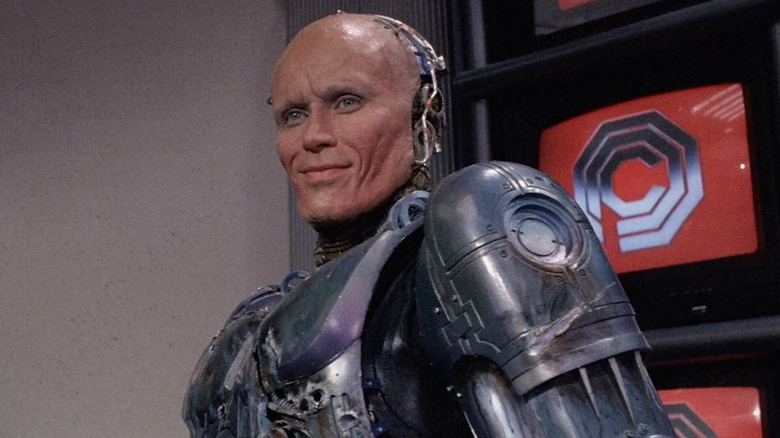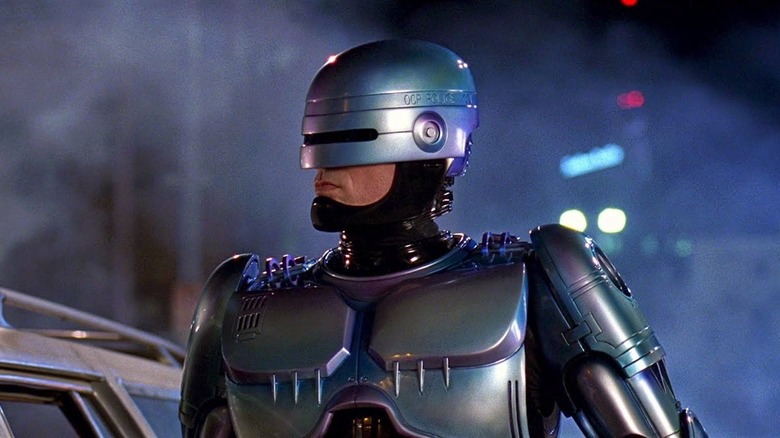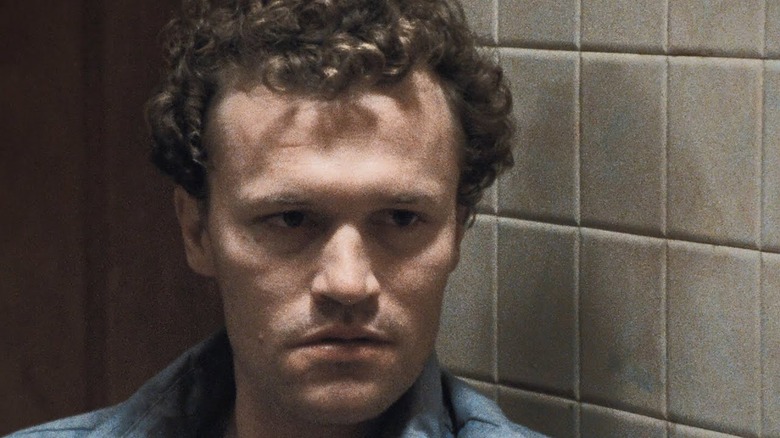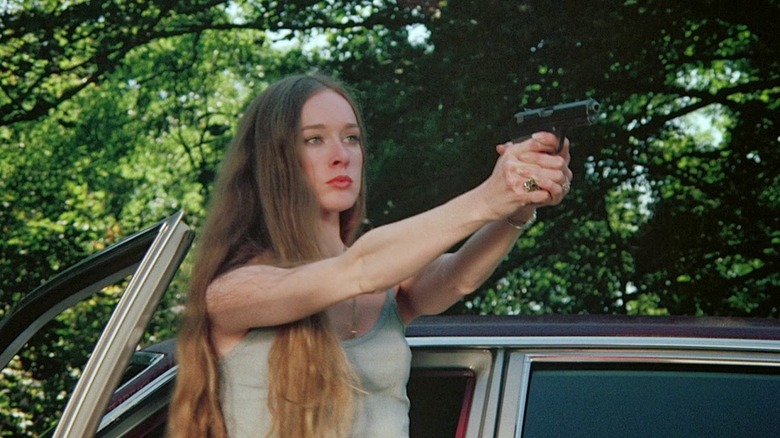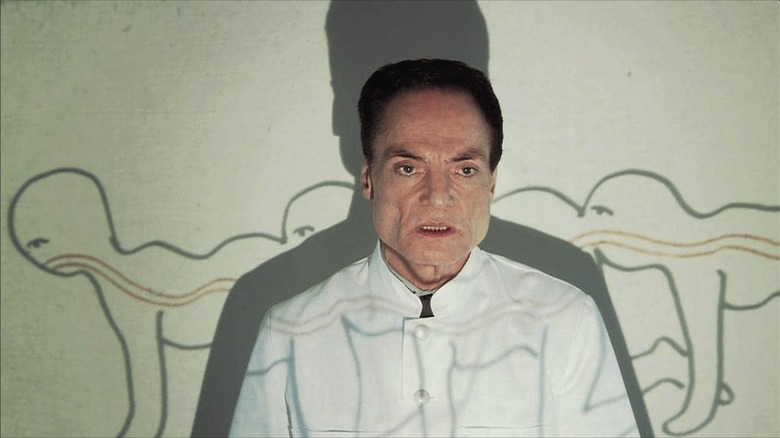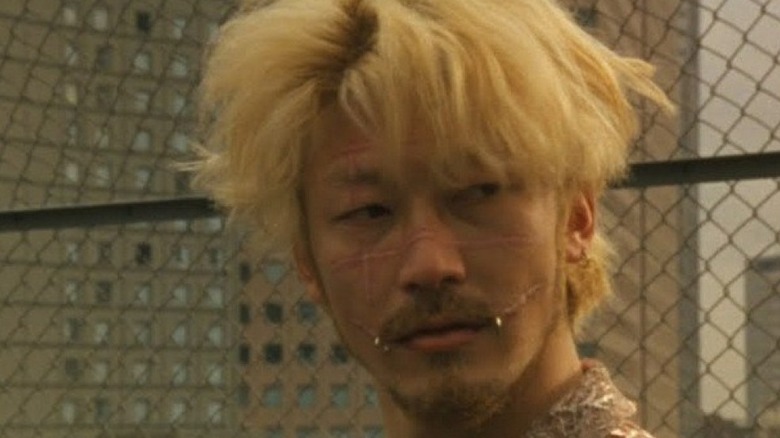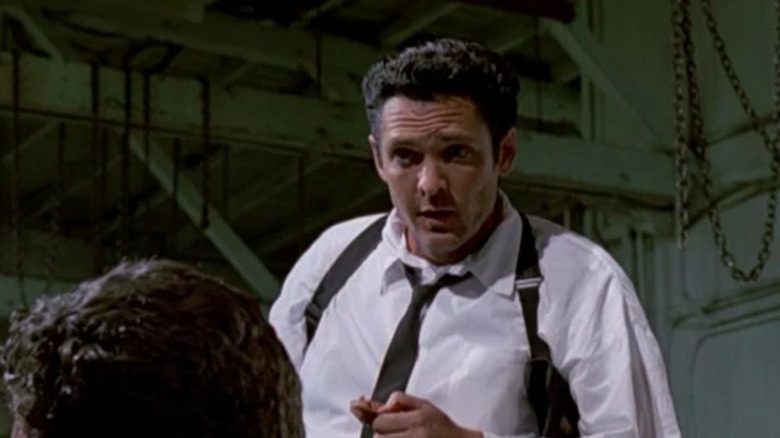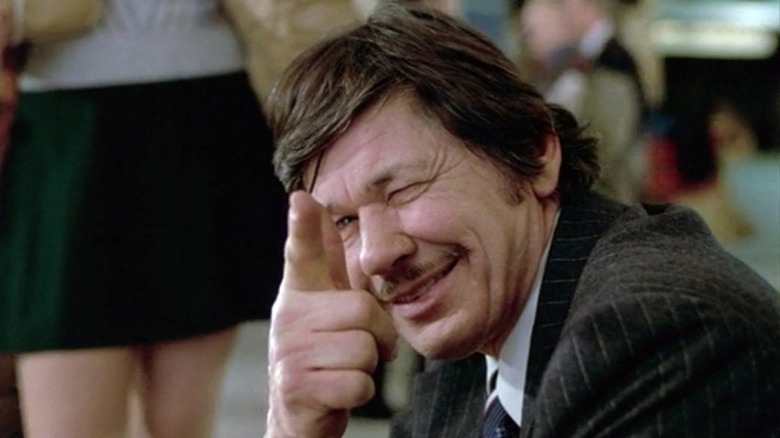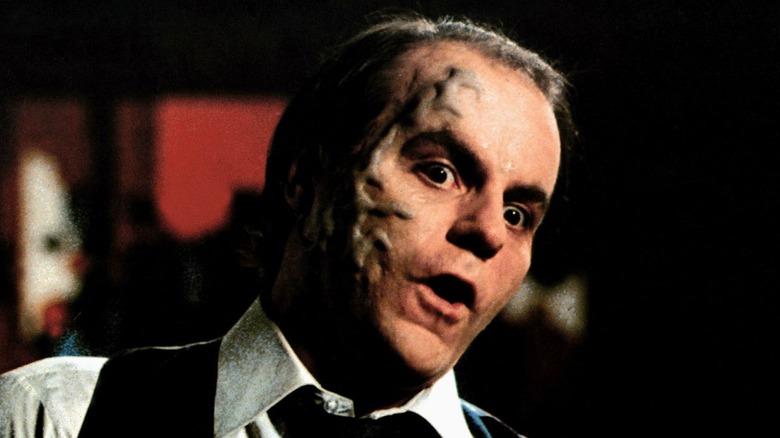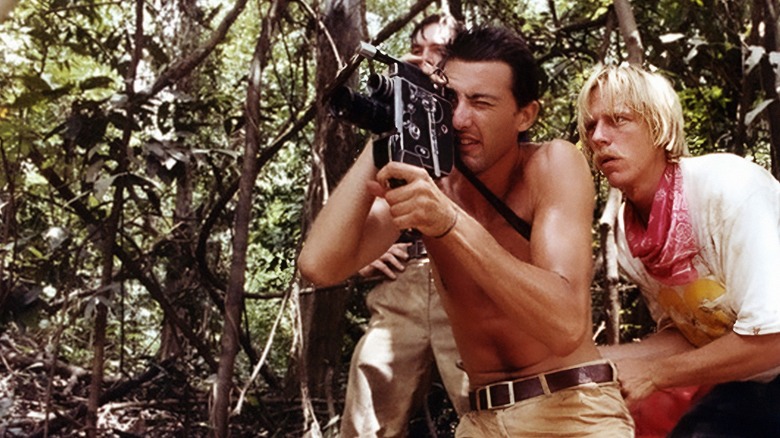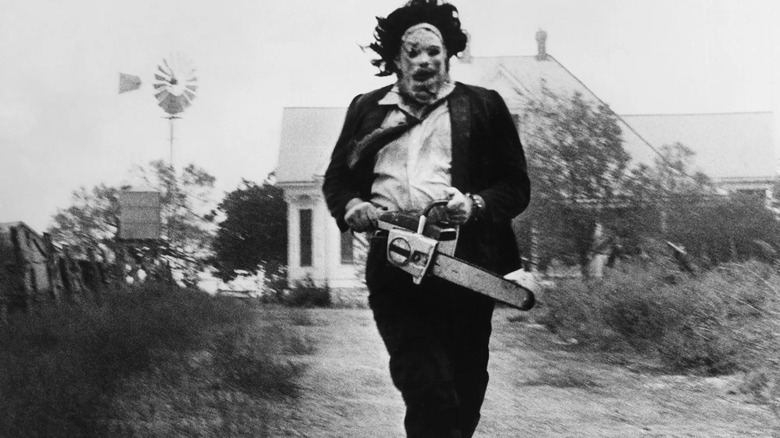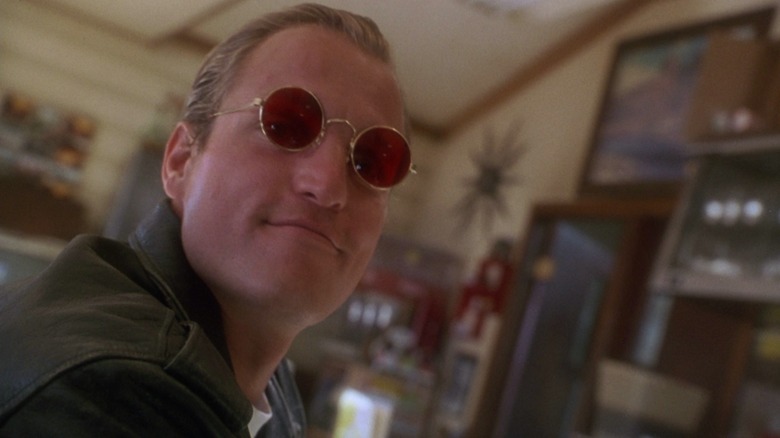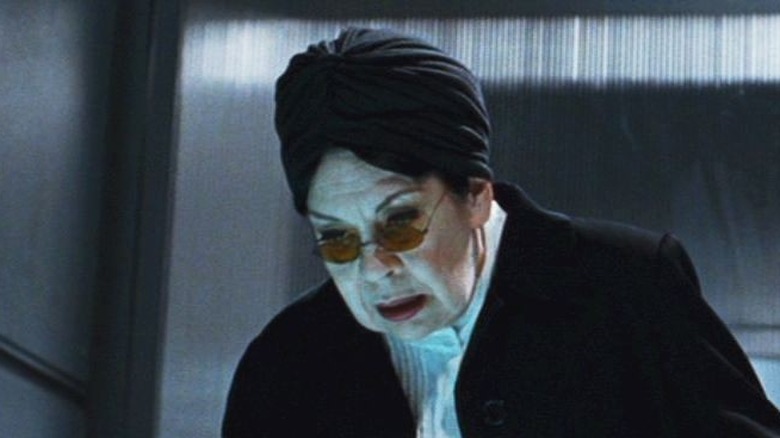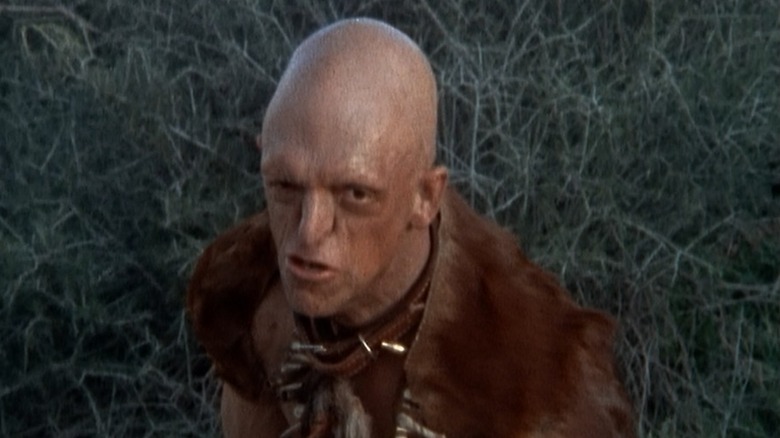R-Rated Movies That Went To The Extreme
Once in a while, an R-rated movie is an experience that we're not sure we're meant to enjoy. Not like the taboo excitement of true crime, or the cathartic pain that comes with some documentaries. More like a feeling that we're not sure about who the intended audience is for this film ... and, dear God, are we that audience? We're watching something that skates off the edge of good taste, and just maybe, we're enjoying it.
It's an artistic conundrum that's fueled decades of controversy and censorship, from the famous "I know obscenity when I see it" Supreme Court trial to the U.K.'s all-too-familiar-today right wing conservative dalliance in the '80s with cleansing the landscape of the "video nasty." They're films from the famous to the infamous, movies that revel in pushing the boundaries. Sometimes there's a thoughtful message underneath the morass. Sometimes (and we're looking at you, "The Human Centipede") there isn't. These are the films that went as far as they could, and then a little farther. Maybe they shouldn't have. But deep down, aren't we a little glad that they did?
RoboCop
No one has ever accused director Paul Verhoeven of subtlety, and "RoboCop" may be his greatest masterpiece of anvil-to-the-brain satire. It's a movie so shamelessly, enthusiastically violent that it verges into comedy, and that's the way Verhoeven's team liked it. It also flirted with an X rating eight times before a handful of cuts landed it that marketable R. The later director's cut restores the glorious excess, like Murphy (Peter Weller) being shot to pieces so thoroughly and for so long that it makes Sonny Corleone's nasty death in "The Godfather" look cute.
Troma-level horror, like what happens to Emil (Paul McCrane) when he meets a vat full of some chemical stew, keeps us riveted every time we rewatch "RoboCop." But hidden underneath this gonzo action flick is Verhoeven shoveling his message into the faces of '80s America and beyond. Corporations are the biggest villains in society, and their willingness to consume human blood — shown early in a horrific boardroom scene in which ED-209 goes haywire — is barely a metaphor. It's real life, and some days, all you can do is laugh at the black comedy of it all.
Henry: Portrait of a Serial Killer
Recommending "Henry: Portrait of a Serial Killer" to even die-hard movie fans can be awkward. Murder and sexual assault occur almost every other scene, arranged in jarring set pieces that don't feel traditionally exploitative. It's like looking at a glass entomology display, putting us inside the unhinged mind of a killer. It's a riveting film, despite the intense discomfort it instills in a viewer, and that's thanks to Michael Rooker's breakout performance as Henry.
It's actually only rated R in a few regions of the world, while many territories simply treat it like it's radioactive. But what it brings to cinema, there beyond the edge of good taste, is hard to ignore. It's exactly what it proclaims to be; a clinical, barely-judgmental observation of its subject. Henry, based on the true crimes and tall tales of Henry Lee Lucas, is the cold, calculating figure Patrick Bateman thinks he is. His protégé, Otis (Tom Towles), becomes too animalistic a killer in comparison. Between them is some of the darkest humor you'll ever see, and a chilling finale that's hard to shake off. Something about it all feels like playing in dumpster sewage. And yet, that bad taste is exactly what makes it art.
I Spit On Your Grave
Attempts continue to be made to paint 1978's "I Spit On Your Grave" as a feminist wish-fulfillment fantasy movie, and maybe, with a long discussion on how it subverts the masculinity of "Deliverance" and sets a benchmark for "Promising Young Woman," it can be done. But when one of today's most vocal proponents of this view is a radfem TERF who once suggested putting men in camps, y'know, maybe that's not the argument we should be taking from this particular cinematic piece of fecal matter. It didn't work on the ratings boards, anyway.
It might be easier if "I Spit On Your Grave" didn't spend a literal third of its runtime on the most agonizingly realistic sexual assault scenes in film history. Jennifer's (Camille Keaton) eventual revenge does offer satisfying catharsis, in that dingy exploitation way, and maybe that's what redeems the film for some critics. But do we need a film like this to force us to relive our trauma in order to provide healing, as some argue? No. Just as the LGBTQ+ and Black communities no longer need stories to constantly emphasize the horrors of the past to empower their future, we don't need "I Spit On Your Grave" to tell us that sexual assault is a life-shattering experience before offering up a bloody cookie. The statistics don't lie — enough of us know that fact for ourselves.
The Human Centipede
Body horror is a great genre, offering up eye-searing ways of discussing some thorny social topics. Tom Six, the mind behind 'The Human Centipede," lauds body horror master David Cronenberg as one of his greatest inspirations. That's nice, although that's a bit like if Salt Bae, he of the dirty armed salt sprinkles and overpriced steak fame, came out and said the world acclaimed chef Julia Child was his childhood hero. The MPAA was unmoved.
Six also claims his film has something to say about the generational trauma Nazis left ordinary German citizens. Sure, go with that. In the end, it's a small-budget movie that got its funding by Six casually leaving out key details of the script when talking to investors — specifically, the core premise of stapling buttholes to mouth holes. He then proceeded to make two more movies about that. Did "The Human Centipede" teach us anything new about the human condition? Not really. There have always been sick puppies among us. Some of them can even afford a film camera.
Ichi the Killer
When it comes to hiding biting commentary inside a movie that drives you to take a shower after watching it, Takashi Miike has what Oliver Stone can barely dream of. "Ichi the Killer" does have something to say, in amidst a cornucopia of raw, unpleasant violence that might make even Paul Verhoeven shift in his seat a little bit. It's possibly the closest film to emulate what "Henry: Portrait of a Serial Killer" did. It requires one to witness these horrors, presented without either ecstasy or judgment, and decide what it's worth to us. Does this film matter? Should other films emulate this one?
Miike isn't an amateur director. He can switch gears from horror shows like this one, to video game adaptations and gentle movies for kids. Whatever "Ichi the Killer" is trying to tell you, individually, it's what he meant for it to do. It certainly flips around any notion of the Yakuza as manly protectors, instead revealing a world of sleazy crime in the most extreme of ways. It's no surprise that Shinya Tsukamoto, creator of the "Tetsuo" body horror movies, plays Ichi's handler. This is a glimpse of that same chaos, blended with a vision of reality we didn't want to see.
Reservoir Dogs
The over-the-top violence and language that comes with a Quentin Tarantino movie is expected today. It's familiar, almost prosaic. How will Tarantino shock us this time? In 1992, however, the gonzo pulp that Tarantino brought to mainstream cinemas was so startling that horror masters Wes Craven and Rick Baker walked out of a screening of "Reservoir Dogs." It was a compliment, as Baker would later tell Tarantino, framing the departure as a compliment from people too used to fantastical horror to be comfortable with the realistic depictions of torture these hapless thieves resort to.
Since the shocking content was mostly violence and language, with nary a nip to be found, there's no history of "Reservoir Dogs" being banned from theaters. It wears its R rating a little too comfortably for the average audience, bringing it home that, for ratings boards, doing a little dance number while mutilating a cop is just fine with them. But don't be doing any of that nudie LGBTQ+ stuff, or they'll ban the crap out of you.
Death Wish
Actor Charles Bronson had the best stony face in the business, providing it to unshakable cowboys and stoic soldiers. He died in 2003, and today's unsettling obsession with being the "good vigilante with a gun" in situations that could be handled with a polite word doesn't reflect on his career. It's Bronson's role as Paul Kersey in the franchise-founding 1974 blockbuster "Death Wish" that many of these right wing fantasists base their idealized self on, though, and critics were sounding an alarm on the film's release that's scarily relevant today.
"Death Wish" is the keystone of the vigilante genre, turning its protagonist into a ruthless avenger, and for reasons that seem understandable. The original film and novel understood the ethical dilemmas here, talking openly about the problems that could emerge if vigilantism becomes a social norm. Its violence is of a familiar sort, especially in a world now colored with Frank Castle's newfound popularity. Still, at the time, "Death Wish" pushed a dangerous idea into the open. It's still an open debate how right the critics were to be worried, as it's up to each of us to understand the line between what's acceptable in fiction vs. reality. It's not Charles Bronson's fault that we have people choosing to ignore that line.
Scanners
One gets the sense that, back in the '80s, the entire Canadian Film Board physically braced itself every time they heard that David Cronenberg was filming. 1981 was the year of "Scanners," the cult sci-fi film that brought Cronenberg's brand of body horror worldwide, and all the Film Board had to do was accept that this was a movie with a guy's head full-on exploding within the first half hour.
Strangely, it was the American MPAA that had an issue with the sequence, causing some edits that certainly don't change the impact Revok (Michael Ironside) has on some poor corporatized military telepath. What was even more important than the gory effects was the commentary on hopeful young radicals taking on the established military industrial complex. It's a theme that re-emerges in some form or another through many of Cronenberg's works. As for how that head exploded? Pack a thick balloon full of Wendy's chili and some other gooey junk, and take your best shot. Alternatively, watch a Trump rally and try to follow a single train of thought anywhere in the whole thing.
Cannibal Holocaust
1980's "Cannibal Holocaust" is a movie a lot of people know about, but have never and will never watch. Its history is marred by multiple bans and legal investigations, as this exploitation film's documentary-style realism drew allegations that it was a snuff film, and that there were real deaths involved. There were, as a matter of fact, with seven real animals slain on-screen and off. According to the original DVD commentaries and extras, all the humans came through, for better or for worse.
As to its premise, "Cannibal Holocaust" throws some feckless rescuers into the Amazon jungles to locate a lost crew of documentarians — sort of like if "Apocalypse Now" was about finding Werner Herzog, not Colonel Kurtz. The journey turns into a festival of assault, murder, and yes, cannibalism. It's a genuinely unpleasant experience, a movie that exists because there was an Italian obsession with cannibal movies for a while. According to the director, it's a movie about sensationalism in journalism. According to the rest of us, it sure is a gross movie.
The Texas Chain Saw Massacre
Before TikTok, Liveleak, and torrents showed fledgling internet users way more than they bargained for, some kids earned their hides by watching the sketchiest horror movies on Earth at way too young an age, unsupervised, at a girls' sleepover. 1974's "The Texas Chain Saw Massacre" is the sort of nasty, irresistible treat we'd find ourselves sneaking towards for another watch, staring in awe at Leatherface (Gunnar Hansen) and his impressive array of barnyard tools.
Director Tobe Hooper honestly thought he could get this thing a PG rating, because it's not like he was exploding heads on screen. Not sure how he got to that conclusion, because he wound up editing for an equally gruesome R rating that still got the morality police on his back for decades. Yet "The Texas Chain Saw Massacre" has another thing going for it, besides that horrifying allure it has for kids. It's a genuinely well-made movie, framed by multiple daylight glimpses of gore and a perfectly paced ominousness. There are eight sequels — we can take or leave them, but the original will never die.
Natural Born Killers
Oliver Stone is a weird dude with weird (if thoroughly thought-out) opinions, and that comes through in his movies. Even his failures are fascinating watches, from the controversial "JFK" to the damn near monstrous "Natural Born Killers." "Killers" is meant to be a satire about society's unnatural hunger for violence as fed to us by a complicit media. Instead, Mickey (Woody Harrelson) and Mallory (Juliette Lewis) are filmed by Stone with as much gleeful adoration as the media it condemns, turning the film into a spectacle reviled by critics for its failures.
Robert Downey Jr. puts in a terrific act as the film's Geraldo Riviera-inspired media hound, but the direction he's given still leaves Stone's intended theme on the table. Yes, he's just as invested in the pair's murderous success, but there's so much else going on that he's almost forgotten. Meanwhile, Mallory's hideously abusive childhood and the film's bizarre representation of Indigenous culture turns the whole thing into a failed comedy. Michael Rooker's Henry slaughtered and bludgeoned so that Mickey and Mallory could stumble into undeserved fame.
Martyrs
"Martyrs" feels like a movie you might watch on an ill-considered dare. It's a spectacle of torture and misery so unpleasant that the French classification committee nearly drowned it with an explicit rating before it could be released. Released uncut, and somehow passing with an R in America, it's a horror film with such a precisely delivered theme that it deserves a film student's study and recognition. The discomfort is the point.
Pascal Laugier's descent into religious sadism pierces the Catholic belief that suffering is a redemptive, sometimes holy experience. Its women are put through tortures unimaginable to see if, through their pain, they can earn knowledge of a blessed afterlife. Does it work? That's not the point of the film, which deliberately leaves its viewer with a heavy question at the end. The question the director is asking is, is this suffering worth it? Are we anointed and edified by watching others take this much agony into themselves? Laugier's answer is a definitive no. It's hard not to agree, and it's hard to ignore that, in so many movies of this kind, it's women carrying the burden.
The Hills Have Eyes
Wes Craven always put a surprising amount of thought into his gorefests, and 1977's "The Hills Have Eyes" is no different. There's a rage in this story of an ordinary suburban family pushed to its limits, and it's felt in how unlikable our initial protagonist is. Big Bob Carter exemplifies today's belief in ACAB, as his establishing character moment does everything but say outright that he's a racist old wifebeater. It's a move that makes us sympathetic to a cannibal family that's straight out of a Goya painting. And why not? It's an indictment of how we treat our poorest.
"The Hills Have Eyes" is also inspired by the legend of Sawney Bean and his sprawling cannibal family. And it's that legacy that took this cerebral blood spurter to the edge of X-rated territory, at first. Several death scenes and the final confrontation had to be toned down to get the movie into mainstream theaters, but it doesn't change how brutal its metaphor of the haves vs. the have-nots feels to fans. Even homaging this film's sadistic family automatically pushes the envelope. "The X-Files" has one episode that still gets censored left and right, and that's "Home," a bang-on love letter to both Craven and Tobe Hooper's "Texas Chainsaw Massacre."
If you or anyone you know has been a victim of sexual assault, help is available. Visit the Rape, Abuse & Incest National Network website or contact RAINN's National Helpline at 1-800-656-HOPE (4673).
